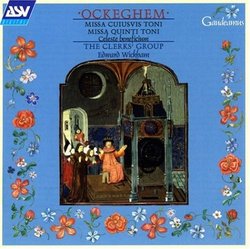A delight for either a novice or a connoisseur
11/25/1999
(5 out of 5 stars)
"This is one of the most intriguing early music recordings in my fairly vast collection. This CD is an example not only of superb singing, but also of spatial puzzles that inhabit some of early music compositions. The Clerks brilliantly bring one of these puzzles to light by singing the movements of Missa Cuiusvis Toni in two of its possible four tones. Here I join with Matthew Westphal in wishing that somebody devote an entire CD just to this mass and record it on all four of its possible tones. The Clerks give an exquisite performance. They represent the technique of ensemble singing at its best. They don't have singers of the caliber of David James, Rogers Covey-Crump or Charles Daniels (except for Robin Blaze who is getting increasingly busy with his solo career), but the Clerks nevertheless rival the Hilliard and the Orlando Consort. In truth, the comparisons are out of place - the Clerks, with their unique pastel blend, are nobody's copycats. Make sure you try their recordings (but hold on to your Hilliard for Ockeghem's Missa Prolationum and Requiem). My e-mail: gkolomietz@yahoo.com"
Ockgehem the way it should be
Gary T. Starr | Chatsworth, CA United States | 06/16/2000
(5 out of 5 stars)
"Luminous lush sound. All of the discs in this series, especially this one, are excellent. The Clerkes Group give the Tallis Scholars a run for their money. Buy this disc!"
Missa Any Which Way
Giordano Bruno | Wherever I am, I am. | 06/05/2008
(5 out of 5 stars)
"Johannes Ockeghem was born in the Duchy of Burgundy in 1410 and died in Burgundy in 1497. Like many composers of the 15th C, he began his musical career as a chorister, and he was reputed in later life to have an extraordinary basso voice. The first documented record of his career comes from a cathedral in Antwerp, in 1443, but there are many suggestions that he had studied with Giles Binchois and associated with Antoine Busnois, the two greatest composers of the older generation. Ockeghem rose quickly in terms of employment, working for the Duke of Bourbon from 1446 to 1448. Around 1450, he moved to paris to serve as maestro di capella at the royal court. He also held the lucrative position of treasurer of the Cathedral of St. Martin in Tours, and he continued in royal service most of his life, becoming quite wealthy. At least once he was posted on a diplomatic mission to Spain, where his influence on musical styles was profound. Musicians often doubled as ambassadors in the Renaissance. Ockeghem's musical output was not large by the standards of his time, but he was venerated by the next generation of Franco-Flemish composers, including Josquin and Obrecht, as the master of masters.
Ockeghem was a profound structural innovator in music, incorporating complexities in his compositions that have defied the understanding of later eras. His masses are often based on enormously difficult intellectual puzzles which could have made sense only to his fellow musicians. His Missa Prolationis, for example, tests the outer limits of polyrhythmic musical notation. The various voices of the mass need to count in different rhythms, sometimes in two, sometimes in three or six, and to change from one count to another in mid phrase, all occurring simultaneously. If performed well, these complexities sound effortless and instinctive to a listener, but they are fiendishly hard on the performer. Clearly Ockeghem was showing off, though his written masses probably were intended as witty teaching tools, exercises for the minds of his choristers.
Missa Cuiusvis Toni (Any Tone) is another intellectual puzzler. The tones in question are the various modes, which can be conceived in modern terms as scales beginning on any note but using only white keys on the piano. Thus, for example, the Phrygian mode is E to e, and the Mixolydian mode is G to g. [If you have an instrument, it would be a good idea to play those two modal scales, to hear what Ockeghem's challenge meant.] The manuscript of Missa Cuiusvis Toni shows the usual five-line staffs, but without a clef sign. Actually singing the mass in any-old mode isn't so easy, since sharps and flats, called ficta, need to be inserted by the performer according to intricate rules. The Clerks' Group performs the mass on this CD primarily in the Phrygian mode, but includes the Kyrie and the Agnus dei in the Mixolydian mode for comparison. The other mass on the CD, Missa Quinti Toni (Fifth Mode) is more straightforward.
What does all this complexity sound like to a listener? Honestly, I doubt that many listeners of today will have the slightest idea of the intellectual challenge involved. Ockeghem's music exists on two levels, the mental and the aesthetic. Aesthetically, this mass is serene, austere but magical in its floating suspended harmonies, rhythmically subtle to the point of sounding like improvisation. Beautiful music, in short, is what you hear. I suppose buying the CD is your thank-you to the performers for traversing Ockeghem's maze.
No other vocal consort has mastered Ockeghem's musical idiom as convincingly as The Clerks' Group. Their recordings of nearly all of Ockeghem's surviving masses and motets are superb. Of the singers on this CD, only male alto Robin Blaze is independently well known. What matters here is not the individual voices but the tight ensemble and balanced blend of timbres.
And now, having read my explications, you can listen to this performance and try to hear the complexities, or you can simply enjoy the music's "effortless" grace."


 Track Listings (13) - Disc #1
Track Listings (13) - Disc #1